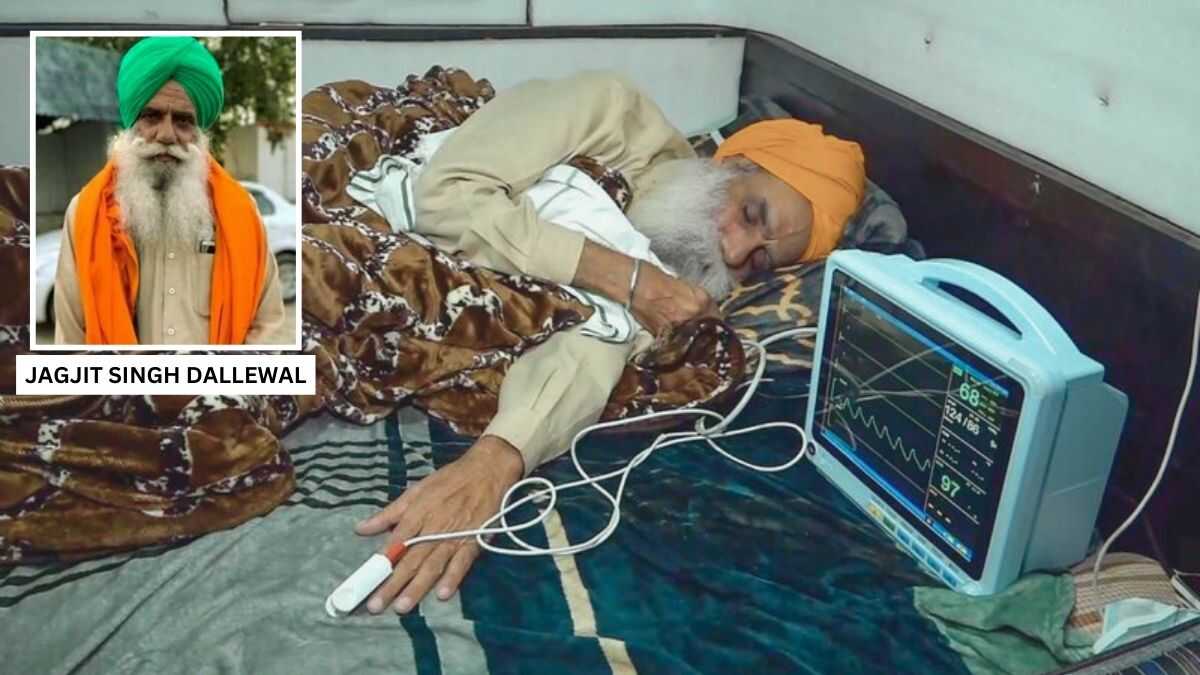SC to Review Punjab on Jagjit Singh Dallewal Health Amid Hunger Strike
Jagjit Singh Dallewal, a prominent farmer leader, has entered the 36th day of his indefinite hunger strike at the Punjab-Haryana border in Khanauri. The ongoing protest aims to secure legal guarantees for Minimum Support Prices (MSP) for crops and address farmers’ demands.
However, Dallewal’s deteriorating health has sparked concerns, prompting the Supreme Court to intervene and review Punjab’s response to ensure his medical treatment.
The apex court’s hearing, scheduled for December 31, highlights the urgency of the situation as farmers continue to resist government efforts to move Dallewal to a hospital. This article explores the developments surrounding the protest, court proceedings, and the implications for Punjab’s administration.
Jagjit Singh Dallewal Protest: A 36-Day Hunger Strike
Jagjit Singh Dallewal, aged 70, began his hunger strike on November 26, 2023, at the Khanauri border. Representing farmers under the Samyukta Kisan Morcha (Non-Political) and Kisan Mazdoor Morcha, Dallewal’s protest underscores the farmers’ demand for a legal MSP guarantee and other agricultural reforms.
Key Demands of the Farmers
- Legal MSP Guarantee: Farmers seek legislation to ensure MSP for crops, protecting them from market fluctuations.
- Loan Waivers and Subsidies: Financial relief for debt-ridden farmers remains a core demand.
- Withdrawal of Cases: Farmers arrested during earlier protests demand unconditional release.
- Comprehensive Agricultural Policies: Calls for long-term policies to ensure sustainable farming practices.
Escalating Health Concerns
As Dallewal’s fast continued, his health began deteriorating, raising alarms among supporters and officials. Despite repeated appeals, Dallewal refused medical treatment, fearing forced evacuation from the protest site.
Supreme Court’s Intervention and Timeline of Events
The Supreme Court took cognizance of Dallewal’s condition and the Punjab government’s inability to provide medical assistance. On December 20, the bench emphasized that safeguarding Dallewal’s health was the state’s responsibility, instructing officials to act in compliance with legal directives.
During a hearing on December 28, the court criticized the Punjab government for failing to move Dallewal to a hospital. It questioned both the intent of the protesters and the government’s reluctance to enforce orders.
The upcoming virtual hearing at 11 AM on December 31, led by Justices Surya Kant and Sudhanshu Dhulia, will examine compliance reports submitted by Punjab’s Chief Secretary and Director General of Police (DGP). The court may order further measures to ensure Dallewal’s health, including central government assistance if required.
Punjab Government’s Efforts to Resolve the Crisis
Punjab government officials have made multiple attempts to convince Dallewal and his supporters to accept medical aid. On December 29, a high-level team approached Dallewal but faced resistance from farmers determined to continue their agitation.
The government cited logistical difficulties in accessing Dallewal due to the presence of a large crowd blocking entry points. Farmers formed human chains to prevent authorities from transferring him to a hospital.
Punjab officials assured the Supreme Court of their intent to comply with orders, seeking additional time and assistance from the central government. The compliance report will be evaluated during the December 31 hearing.
Farmers’ Resistance and Fear of Forceful Removal
Dallewal and his supporters remain resolute, fearing that hospitalization could lead to his removal from the protest site. The farmers have fortified their positions at the Khanauri border, intensifying their stand against any external intervention.
Why Farmers Oppose Intervention
- Trust Deficit: Farmers fear betrayal if Dallewal is removed from the site under the pretext of medical aid.
- Symbol of Protest: Dallewal’s hunger strike symbolizes their struggle, and any disruption could demoralize supporters.
- Demand Fulfillment First: Protesters insist on concrete action on their demands before considering any compromise.
The protest has drawn reactions from political parties, with opposition leaders criticizing the Punjab government’s handling of the crisis. Calls for resolving farmers’ demands through dialogue rather than forceful measures have gained momentum.
Public support for farmers remains strong, especially in Punjab and Haryana, where agriculture forms the backbone of the economy. The protest has reignited memories of the 2020-21 farmers’ agitation, which led to the repeal of contentious farm laws.
The Supreme Court’s review on December 31 is a crucial step in addressing the standoff between farmers and the government over Jagjit Singh Dallewal’s health and the broader demands for agricultural reforms. While the Punjab government faces criticism for delays, the protesters remain defiant, reflecting the high stakes involved.
As the legal and political battle unfolds, the focus remains on saving Dallewal’s life while respecting the farmers’ rights to protest peacefully. The outcome of the hearing could shape the future of farmers’ movements in India.
FAQs
What are the farmers demanding in the current protest?
Farmers are demanding a legal guarantee for Minimum Support Prices (MSP) for crops, loan waivers, subsidies, and withdrawal of criminal cases against protesters.
Why has Jagjit Singh Dallewal refused medical treatment?
Dallewal fears forceful removal from the protest site if he agrees to hospitalization, which could weaken the movement’s impact.
What actions has the Supreme Court taken so far?
The court has instructed Punjab to ensure Dallewal’s safety and health, criticizing delays and demanding compliance by December 31.
What challenges does the Punjab government face in resolving the crisis?
The government faces logistical barriers due to large crowds and strong resistance from farmers, making it difficult to provide medical aid without escalating tensions.
How does this protest relate to the earlier farmers’ movements?
This protest is a continuation of demands for agricultural reforms, echoing the 2020-21 movement that led to the repeal of controversial farm laws.

PM Internship Scheme; Good Response 6.21 Lakh Applicants
PM Internship Scheme 2024-25: Over 6.21 Lac Applications Flood Program The PM Internship Scheme 2024-25 has witnessed an extraordinary response, with 6.21 lakh applications submitted for 1.27 lakh available internships during its initial rollout. Announced in the Union Budget 2024, this flagship initiative aims to empower one crore young Indians with hands-on work experience over …
Biography Of Punjab 1947 In Punjabi

